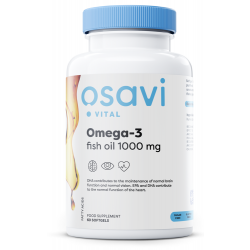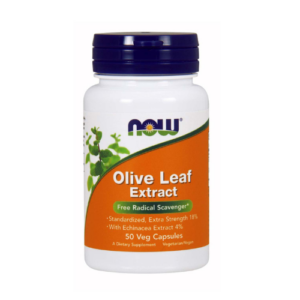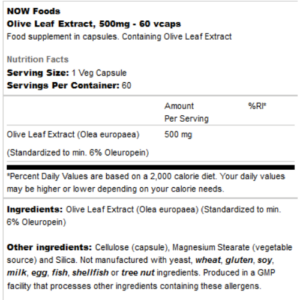Osavi Omega-3 Fish Oil Molecularly Distilled, 60 softgels
€7.99
Are you looking for a way to improve brain function? Or do you want to take care of the proper functioning of your heart or eyes? Omega-3 fatty acids can help you take care of your body comprehensively. Reach for fish oil and see for yourself the benefits you can feel and notice.Fish oil is a source of omega-3 fatty acids and refers to two types of fatty acids: eicosapentaenoic acid (EPA) and docosahexaenoic acid (DHA). They are mainly found in fish, and in smaller quantities in other animal products or phytoplankton. They are important for the optimal functioning of individual systems. Omega-3 plays a structural role in the body – it is a component of phospholipids, which form the structures of cell membranes. DHA is found, among others, in the retina and brain. These acids also indirectly affect functions in the cardiovascular, respiratory, endocrine and immune systems [1].
Docosahexaenoic acid (DHA) contributes to the maintenance of optimal brain function and also has an impact on normal vision. It is thought that omega-3 fatty acids may protect against neurodegeneration in the elderly and reduce the risk of cognitive decline [1, 2]. Low intake of these acids may contribute to mood and psychotic disorders, among others [9]. Studies have shown that they are a valuable support for the visual organ in people working at a computer. They have a positive effect on the condition of the eyes, helping to reduce dryness [3]. It has also been shown that omega-3 intake helps the heart and circulatory system to work properly [4]. These acids contribute to lowering triglyceride levels, which may have a role in reducing the risk of cardiovascular disease [5].
Omega-3s are essential fatty acids and must therefore be provided with the diet. They are divided into ALA, i.e. α-linolenic acid (found e.g. in flaxseed oil, soybean oil, rapeseed oil and olive oil), and EPA (eicosapentaenoic acid) and DHA (docosahexaenoic acid), whose sources are fatty fish (e.g. salmon, mackerel, tuna, herring and sardines). EPA and DHA are bioactive forms – in order for the body to utilise ALA, it must be converted to EPA and DHA. However, this conversion is limited [1, 10].
Food supplements containing fish oil can be helpful in taking care of the body’s optimal performance.
The Osavi product is a specially formulated omega-3 fatty acid concentrate derived from the oil of pelagic fish (anchovies) from sustainable fisheries in the Pacific Ocean. The supplement is produced and tested according to the GOED (World EPA and DHA Omega-3 Organisation) monograph, and the oil used in its production is certified Friend of the Sea. There are 1,000 mg of purified fish oil per capsule and 2,000 mg of oil in the recommended daily serving (2 capsules), including min. 700 mg of omega-3 fatty acids.The product has a high content of EPA (min. 360 mg) and DHA (min. 240 mg). Omega-3 fish oil 1000 mg is a supplement in soft capsule form providing the essential fatty acids EPA and DHA.
Why would someone benefit from supplementing with Omega-3 fish oil 1000 mg?
– Docosahexaenoic acid (DHA) contributes to the maintenance of normal brain function and vision.
– Eicosapentaenoic acid (EPA) and docosahexaenoic acid (DHA) contribute to the normal function of the heart.
What is special about softgels Omega-3 fish oil 1000 mg?
– Special formulation of concentrated omega-3 fatty acids derivable from pelagic fishes (anchovies).
– Fish oil from pelagic fishes sourced from sustainable fishing practices at the Pacific Ocean (Friend of the Sea).
– Highly purified fish oil produced according to GOED monograph (Global organisation of EPA and DHA Omega-3s).
– Rich in essential unsaturated fatty acids EPA and DHA.
– Oil produced using molecular distillation.
– Sugar-free, gluten-free, lactose-free, soy-free, GMO-free.
– Packaging made of BioPET (30% of the plastic comes from sugar cane).
[1] Omega-3 Fatty Acids. Fact Sheet for Health Professionals. National Institutes of Health. Pobrano 09.08.2023 z https://ods.od.nih.gov/factsheets/Omega3FattyAcids-HealthProfessional/.
[2] Derbyshire E. (2018). Brain Health across the Lifespan: A Systematic Review on the Role of Omega-3 Fatty Acid Supplements. Nutrients;10(8):1094. doi: 10.3390/nu10081094. PMID: 30111738; PMCID: PMC6116096.
[3] Bhargava R. et. al. (2015). Oral omega-3 fatty acids treatment in computer vision syndrome related dry eye. Cont Lens Anterior Eye; 38(3):206-10. doi: 10.1016/j.clae.2015.01.007. Epub 2015 Feb 16. PMID: 25697893.
[4] Pauwels EK, Kostkiewicz M. (2008). Fatty acid facts, Part III: Cardiovascular disease, or, a fish diet is not fishy. Drug News Perspect; 21(10):552-61. doi: 10.1358/dnp.2008.21.10.1314058. PMID: 19221636.
[5] Skulas-Ray AC. et. al. (2019). American Heart Association Council on Arteriosclerosis, Thrombosis and Vascular Biology; Council on Lifestyle and Cardiometabolic Health; Council on Cardiovascular Disease in the Young; Council on Cardiovascular and Stroke Nursing; and Council on Clinical Cardiology. Omega-3 Fatty Acids for the Management of Hypertriglyceridemia: A Science Advisory From the American Heart Association. Circulation; 17;140(12):e673-e691. doi: 10.1161/CIR.0000000000000709. PMID: 31422671.
[6] Szabó Z. et. al. (2020). The Potential Beneficial Effect of EPA and DHA Supplementation Managing Cytokine Storm in Coronavirus Disease. Front Physiol.; 11:752. doi:10.3389/fphys.2020.00752.
[7] Goldberg RJ, Katz J. 2007). A meta-analysis of the analgesic effects of omega-3 polyunsaturated fatty acid supplementation for inflammatory joint pain. Pain; 129(1-2):210-23. doi: 10.1016/j.pain.2007.01.020. PMID: 17335973.
[8] Chang JP. Et. al. (2019). High-dose eicosapentaenoic acid (EPA) improves attention and vigilance in children and adolescents with attention deficit hyperactivity disorder (ADHD) and low endogenous EPA levels. Transl Psychiatry; 20;9(1):303. doi: 10.1038/s41398-019-0633-0. PMID: 31745072; PMCID: PMC6864068.
[9] McNamara RK, Almeida DM. (2019). Omega-3 Polyunsaturated Fatty Acid Deficiency and Progressive Neuropathology in Psychiatric Disorders: A Review of Translational Evidence and Candidate Mechanisms. Harv Rev Psychiatry; 27(2):94-107. doi: 10.1097/HRP.0000000000000199. PMID: 30633010; PMCID: PMC6411441.
[10] Gerster H. (1998). Can adults adequately convert alpha-linolenic acid (18:3n-3) to eicosapentaenoic acid (20:5n-3) and docosahexaenoic acid (22:6n-3)? Int J Vitam Nutr Res.;68(3):159-73. PMID: 9637947.



What is In
Omega-3 Fish Oil Molecularly Distilled, 1000mg (Lemon) – 60 softgels
| Amount Per Serving |
%RI* | |
|---|---|---|
| Energy value | 84 kJ / 20 kcal | |
| Fat | 2 g | |
|
Of which saturated fatty acids
|
0.70 g | |
|
Of which unsaturated fatty acids
|
1.30 g | |
| Carbohydrates | 0.20 g | |
|
Of which sugars
|
0 g | |
|
Of which polyols
|
0.20 g | |
|
Of which starch
|
0 g | |
| Fibre | 0 g | |
| Protein | 0.50 g | |
| Salt | 0 g | |
| Fish oil (TG 18/12) | 2000 mg | |
|
Of which
|
||
|
Omega-3 acids: min.
|
700 mg | |
|
EPA (eicosapentaenoic acid) min.
|
360 mg | |
|
DHA (docosahexaenoic acid) min.
|
240 mg | |
|
Other omega-3 acids min.
|
100 mg |
*Percent Daily Values are based on a 2,000 calorie diet. Your daily values may be higher or lower depending on your calorie needs.
Ingredients: Fish oil (TG 18/12), Of which, Omega-3 acids: min., EPA (eicosapentaenoic acid) min., DHA (docosahexaenoic acid) min., Other omega-3 acids min.
Recommended use: Recommended daily intake: 2 capsules.
Warnings Recommended daily dose should not be exceeded. The beneficial effect is obtained with a daily intake of 250 mg of EPA and DHA. Food supplements should not be used as a substitute for a balanced diet. A varied diet and a healthy lifestyle should be carried out to help maintain normal health. Store in a dark and dry place at room temperature, out of the reach of young children.
Out of stock
| Weight | 0.2 kg |
|---|
Shipping is free for orders over €55 for up to 15kg.
Otherwise, it’s a fixed flat rate of €5.95 for up to 15kg of shopping. This just about covers what we pay Fastway for each shipping label.
What it doesn't cover is the cost of handpicking and carefully packing your order. We absorb those costs so we can keep the shipping charge as low as possible for you.






